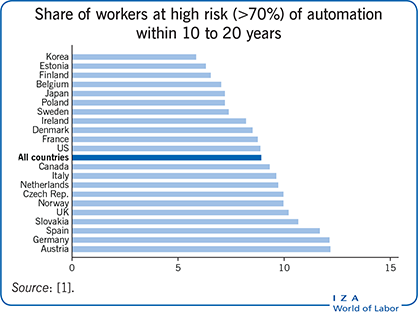Elevator pitch
The information technology revolution has had dramatic effects on jobs and the labor market. Many routine and manual tasks have been automated, replacing workers. By contrast, new technologies complement non-routine, cognitive, and social tasks, making work in such tasks more productive. These effects have polarized labor markets: While low-skill jobs have stagnated, there are fewer and lower paid jobs for middle-skill workers, and higher pay for high-skill workers, increasing wage inequality. Advances in artificial intelligence may be accelerating computers' ability to perform cognitive tasks, heightening concerns about automation of even high-skill jobs.

Key findings
Pros
- Technology complements many tasks, increasing productivity, quality, and innovation.
- Big data and machine learning are increasing machines' ability to perform cognitive, physical, and even some social (language) tasks.
- Greater access to data, analysis tools, and telecommunications allows many workers to focus more on social interactions, collaboration, continuous improvement, and innovation.
- Technology makes many high-skill jobs more intrinsically motivating, enabling more tasks, skills, and decentralization.
Cons
- Machines substitute for humans in many manual and routine jobs.
- The pace at which machines gain the ability to perform cognitive tasks is faster than in the past, making adaptation by workers more difficult.
- Labor markets have polarized and inequality has risen, with relatively less demand for mid-skill workers and increased value for high-skill workers.
- Technology makes many middle-skill jobs less intrinsically motivating, with fewer tasks and skills, and more centralization and monitoring.
Author's main message
Technology has opposing effects on jobs. It facilitates automation, creating fewer and less motivating middle-skill jobs. Conversely, it complements social and innovation tasks, creating more interesting low- and high-skill jobs. This causes labor market polarization, "hollowing out" demand for middle-skill jobs, and increasing wage inequality. Some claim that computers will soon replace many workers as artificial intelligence advances. Others are skeptical, as previous technological advances did not lead to mass unemployment. Policymakers should encourage technology that complements employees' work, and should foster education and training that help workers adapt to change.
This article first appeared on IZA World of Labor in March 2017. Reproduced with permission


